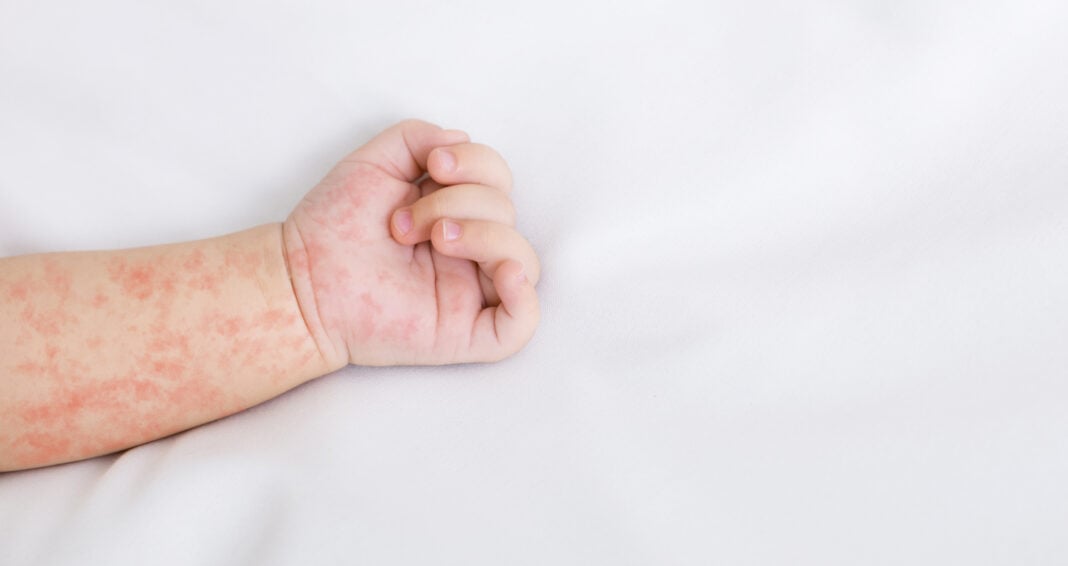Measles Discovered in North Alabama Child
Reported by Mike Hobson
September 26, 2025
A north Alabama child who contracted measles is on the mend, and state officials said there was no transmission of the virus. The Alabama Department of Public Health (ADPH) was notified last week that a child under 5 years of age living in North Alabama has been confirmed to have measles. The unvaccinated child contracted measles while traveling out of the United States.
The comments from Dr. Scott Harris, Alabama’s State Health Officer, came after a meeting of the Alabama Department of Public Health Thursday, in which officials stressed the importance of vaccination amid threats from diseases and federal policy changes.
Dr. David Thrasher, a pulmonary physician based in Montgomery, said that vaccinating children is very important. If he had to choose one, he said, it would be the measles, mumps and rubella vaccine.
“Last year, seven anti-vaccine bills were proposed in the Legislature. I feel really good about going into this year, but I’d rather us not be, and Scott (Harris) particularly, being a lightning rod,” Thrasher said.
Alabama has had one recorded case of measles this year amid a breakout in the United States. State health officials said the five-year-old child, who was not vaccinated, contracted the disease while on a trip. The child’s siblings were vaccinated against the disease, and state health officials have not disclosed the reason for the disparity. The child was not enrolled in day care, according to state officials.
It was the first recorded case of the disease since 2002.
Alabama Health Officer Dr. Scott Harris said in an interview after the meeting the child is now fine and there have been no other cases reported.
“We’ve not found any evidence of transmission. This was a travel-associated case. It was somebody that came from an area where measles is endemic, and then came back to Alabama,” Harris said after the meeting. “We have a pretty good sense of how they were able to get it, which is different than a child in a day care who’s never left the state and got measles, which is a big alarm.”
Dr. Carrie Atcheson, a physician on the board, warned of the dangers of measles and her experience with an outbreak years ago in Washington state.
“We couldn’t go anywhere,” Atcheson said. “We got a list in the paper of all the places where somebody who had measles had been, and it was basically everywhere public. It changes you.”
A federal vaccine panel, organized by U.S. Health and Human Services Secretary Robert F. Kennedy, Jr., met Thursday and is expected to delay a Hepatitis B vaccine for children. The panel will also make recommendations for the COVID-19 vaccine for this fall. For now, Harris said, people should consult with their physicians.
“I think health care providers should definitely get the vaccine unless there’s some contraindication,” Harris said. “You’re working with vulnerable populations.”
Thrasher said of all the people at high risk of COVID, especially pregnant women, should get the vaccine.
“Of the women who are admitted between March and April this year, 30% of those were pregnant and those were unvaccinated. It’s the only way to protect that newborn,” Thrasher said.
Chief Medical Officer Dr. Karen Landers reminds parents to make sure their children are up to date with their measles vaccinations. If exposed, unvaccinated people have a 90 percent chance of becoming infected, and infected people can spread the disease several days before becoming symptomatic.
Measles is a serious viral respiratory illness that lives in the nose and throat mucus of infected people. It spreads when people breathe in or have contact with virus-infected fluid and can pass through droplets sprayed into the air when someone with measles sneezes or coughs. Symptoms usually appear 7-14 days later.
Dr. Landers said, “Measles follows a pattern in which the child first develops fever, cough, runny nose, and watery/red eyes, then a rash develops. Persons can start spreading the virus up to four days before symptoms appear, and those with weak immune systems can spread the measles virus longer.”
No specific antiviral drug is available to treat measles. To help manage the symptoms, parents can ensure the child gets plenty of fluid and rest and give a non-aspirin fever medicine such as acetaminophen or ibuprofen. In some cases, measles can lead to other problems, such as ear infections, pneumonia, or encephalitis.
For most children, measles protection is part of the measles-mumps-rubella vaccine (MMR), or measles-mumps-rubella-varicella vaccine, given when children are 12 to 15 months old and again when they are 4 to 6 years old. The first MMR vaccine can be given to babies as young as 6 months of age if they will be traveling internationally or during an outbreak. Estimates of the effectiveness of the MMR vaccine are 99 percent in measles prevention after the second vaccination.
Vaccines are available at pediatricians’ offices or county health departments. Getting the MMR vaccine is much safer than getting the measles disease.
Parents should call a doctor immediately if they believe their child has measles or if their child has been around someone who has measles, especially if their child is an infant, is taking medication that suppresses the immune system, has tuberculosis, cancer or a disease that affects the immune system or has not received two doses of the measles vaccine.
To learn more about the measles vaccines, go to ADPH’s measles website.
Source: Alabama Department of Public Health, alabamareflector.com

















